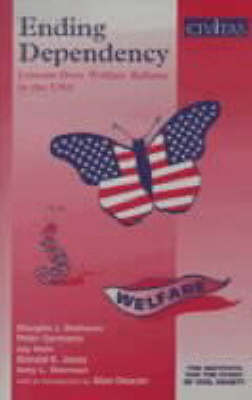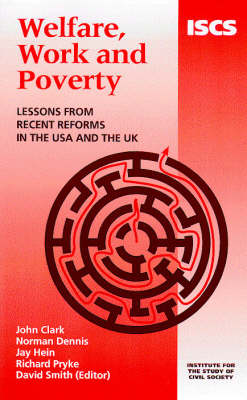Civil Society S.
2 primary works • 3 total works
Book 3
"...one of the most talked about books of the year ...it has defined the terms of debate about lone parenthood, informed politicians, and won flattering notices in leader columns." New Statesman and Society "It was the publication in 1992 of the now famous Families Without Fatherhood report by two left-wing sociologists, Norman Dennis and George Erdos, which first called this whole anti-marriage (and anti-masculine) ideology into question. They pointed to the gradual collapse of the internal coherence of working-class culture caused by the relegation of men to the margins of social and family life in the inner cities and council estates of Britain. In doing so they were challenging the social work orthodoxy head on." Clifford Longley, The Daily Telegraph "Many on the left say that ...the link between lone-parenthood, crime and welfare dependency is unproven. But some powerful proponents of that linkage, who happen to be Labour supporters, such as Norman Dennis, George Erdos and A.H. Halsey, have put a radical back-to-basics cat among the status-quo welfare pigeons." The Economist "Dennis and Erdos, and A.H.
Halsey who provides the preface, argue the 'respectable' working class, even when faced with high levels of unemployment in the 1930s, did not turn to crime or rioting." Community Care "...interesting precisely because its authors ...are able to break through both left and right knee-jerk responses." The Guardian "For a book that opens out argument, rather than just dishes it out, read Norman Dennis." Times Literary Supplement "Whatever the truth of the argument, it is set to rage for some time. But if Norman Dennis's thesis is correct, we may all need to rethink our social attitudes." Times Education Supplement
Halsey who provides the preface, argue the 'respectable' working class, even when faced with high levels of unemployment in the 1930s, did not turn to crime or rioting." Community Care "...interesting precisely because its authors ...are able to break through both left and right knee-jerk responses." The Guardian "For a book that opens out argument, rather than just dishes it out, read Norman Dennis." Times Literary Supplement "Whatever the truth of the argument, it is set to rage for some time. But if Norman Dennis's thesis is correct, we may all need to rethink our social attitudes." Times Education Supplement
Book 12
Ending Dependency
by Douglas J. Besharov, Peter Germanis, Jay Hein, Donald K. Jonas, and Amy L. Sherman
Published May 2001
There are few changes in social policy that have been so radical and so contentious as those made to the US welfare system in the 1990s. The reforms abolished the idea of a "right" to welfare. Claimants were to be steered firmly into the workforce, with strict time limits for those claiming benefits - no more than two years at a stretch, and no more than five years in a lifetime. The reforms were denounced by some of President Clinton's former supporters, who warned of an increase in poverty, and of the impossibility of finding jobs for so many new entrants to the labour market. However, the welfare rolls have fallen by over half, while poverty rates have also fallen. The reforms have been a success. As Alan Deacon says in his introduction, this is a great time to be a conservative on welfare policy in the USA. In spite of this, the contributors to this volume resist the temptation to triumphalism and examine the extent to which the fall in welfare rolls have been attributably to other factors, such as the strength of the US economy, and the introduction of the Earned Income Tax Credit. Alan Deacon asks what lessons the US experience offers the UK.
There are similarities between the language of New Labour and that of US welfare reformers, but the Blair government has shown itself unwilling to enforce work requirements, particularly on lone mothers. Until there is a consensus on the absolute requirement to work, the success of US welfare reform will elude the UK.
There are similarities between the language of New Labour and that of US welfare reformers, but the Blair government has shown itself unwilling to enforce work requirements, particularly on lone mothers. Until there is a consensus on the absolute requirement to work, the success of US welfare reform will elude the UK.
Welfare, Work and Poverty
by John Clark, Norman Dennis, Jay Hein, and Richard Pryke
Published 25 April 2000
Welfare reform has become one of the hottest political topics of recent years. Not only is the welfare state draining billions from the economy, it has given rise to an underclass, lacking the social capital necessary to participate in mainstream society. In this collection of essays the authors consider attempts to reform welfare in both the USA and the UK. David Smith is unimpressed by the Blair government's two flagship policies, the much vaunted New Deal and the introduction of the working families tax credit. Norman Dennis dissects the hollow rhetoric of the official line on the family, and exposes the anti-family tendencies of proponents of the 'Third Way'. Richard Pryke dismisses exaggerated poverty statistics and finds the real problem to be an underclass concentrated in social housing. It is left to US contributors John Clark and Jay Hein to provide an example of welfare reform that works. Since the 1996 welfare reform legislation, the USA has seen caseloads fall by nearly 40 per cent nationwide, with some states showing falls of over 80 per cent.
In Britain, on the other hand, half-hearted and piecemeal measures have failed to reform a system that saps incentive and rewards bad behaviour. It need not be like this, and it is not too late to change. "The reality is that the New Deal has done very little of what is claimed for it. Of the 191,000 people placed into jobs through the New Deal since its inception, more than 50,000 were back on benefits within three months...it is likely that the numbers ultimately returning to the dole are even greater...Of the rest, the vast majority would have found jobs anyway, thanks to the strength of the economy." The Sunday Times
In Britain, on the other hand, half-hearted and piecemeal measures have failed to reform a system that saps incentive and rewards bad behaviour. It need not be like this, and it is not too late to change. "The reality is that the New Deal has done very little of what is claimed for it. Of the 191,000 people placed into jobs through the New Deal since its inception, more than 50,000 were back on benefits within three months...it is likely that the numbers ultimately returning to the dole are even greater...Of the rest, the vast majority would have found jobs anyway, thanks to the strength of the economy." The Sunday Times


